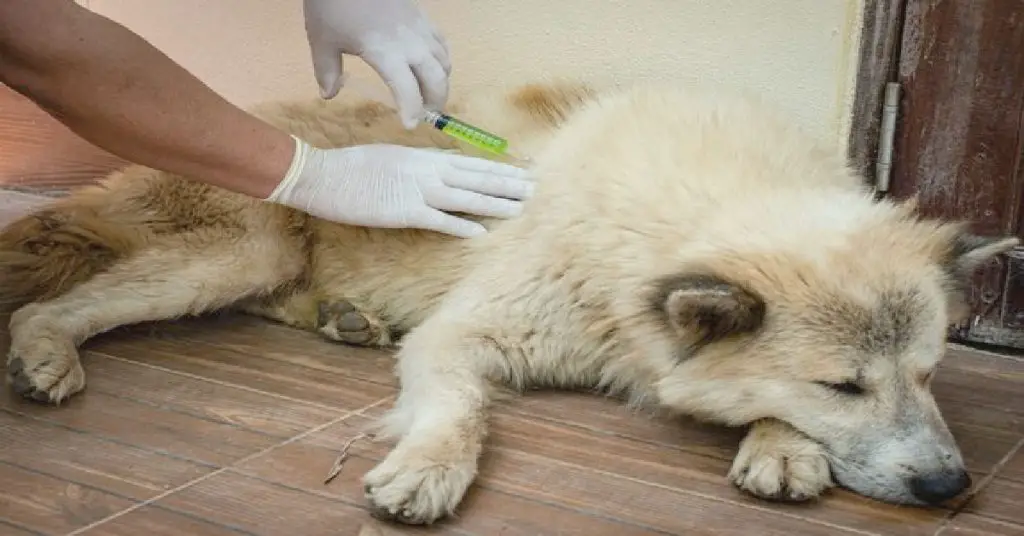If your dog has diarrhea, give them plain, cooked white rice and boiled chicken. Beyond rice, other simple foods that can help relieve your dog’s diarrhea include pumpkin, cottage cheese, peeled boiled potatoes, and plain chicken breast.
Remember to not feed them this bland diet for more than a few days, as it is not balanced. Additionally, you can also consider over-the-counter medications such as Imodium or Pepto-Bismol, but it’s crucial to consult your veterinarian before administering any medication to your dog.
Always remember that chronic diarrhea could be indicative of a more severe underlying issue, and it’s important to seek professional veterinary advice. When it comes to choosing treats for a dog with diarrhea, opt for easily digestible and gentle options such as Orijen Freeze-Dried Dog Treats, Castor & Pollux Organix Chicken Recipe Treats, or Zuke’s Mini Naturals Chicken Recipe Training Treats, to help alleviate their discomfort.
What Causes Dog Diarrhea
Diarrhea in dogs can be a concern for pet parents, and understanding the potential triggers is essential for effective treatment. While occasional stomach upset may not be cause for alarm, persistent diarrhea can be a sign of an underlying health issue. Let’s explore the common triggers and underlying health conditions that can lead to dog diarrhea.
Common Triggers
Several common triggers can lead to diarrhea in dogs, including dietary indiscretion, abrupt diet changes, consuming spoiled food, or the ingestion of non-food items. Additionally, stress or anxiety can also contribute to digestive upset in dogs, leading to diarrhea.
Underlying Health Conditions
Underlying health conditions such as infections, parasites, food allergies, inflammatory bowel disease, and certain medications can also cause diarrhea in dogs. It’s important to consult with a veterinarian to rule out any serious health issues if your dog experiences persistent or recurrent diarrhea.
Identifying Diarrhea In Dogs
Diarrhea is a common gastrointestinal problem in dogs and can be a sign of an underlying health issue. Dog owners need to be able to identify the symptoms of diarrhea and know when to seek veterinary care.
Symptoms
- Frequent loose or liquid stools
- Straining during bowel movements
- Accidents in the house
- Blood or mucus in the stool
- Lethargy
- Vomiting
When To Consult A Vet
Consult a veterinarian if your dog experiences any of the following:
- Diarrhea lasting more than 24 hours
- Frequent or severe vomiting
- Blood in the stool
- Dehydration
- Weakness or lethargy
- Loss of appetite
Home Remedies For Dog Diarrhea
Bland Diet
When your dog is suffering from diarrhea, a bland diet can help soothe their stomach and aid in firming up their stool. The bland diet typically consists of plain, cooked white rice mixed with boiled, skinless, boneless chicken breast. This combination is easy for dogs to digest and can help in settling their upset stomach. Stick to a ratio of 2 parts cooked rice to 1 part cooked chicken and serve it in small, frequent portions throughout the day.
Beneficial Foods
In addition to the bland diet, other simple foods can provide relief for your dog’s diarrhea. Pumpkin is an excellent choice as it contains fiber and essential nutrients that can aid in regulating your dog’s bowel movements. Adding a tablespoon of plain pumpkin puree to their meals can be beneficial. Additionally, cottage cheese, peeled boiled potatoes, and plain chicken breast can also be included in the diet to help alleviate symptoms. However, this bland diet is not nutritionally balanced, so consult your veterinarian and do not feed it to your dog for more than a few days.
Dietary Restrictions
While it’s essential to incorporate beneficial foods, it’s equally important to be aware of dietary restrictions when your dog is experiencing diarrhea. Avoid feeding them fatty, greasy, or spicy foods. Stay away from dairy products like milk, cheese, and yogurt, as well as high-fiber foods and grains. Excluding these items from their diet can help prevent further irritation to the gastrointestinal tract and aid in their recovery.
Over-the-counter Options
When your dog is suffering from diarrhea, some over-the-counter options can provide relief. However, it’s essential to consult with a veterinarian before administering any medication to your dog, as some medications may not be suitable for all dogs. Below are a couple of over-the-counter options that can be considered under the guidance of a veterinarian.
Imodium
Imodium (loperamide) is an over-the-counter medication that can be used to alleviate diarrhea in dogs. It works by slowing down the movement of the intestines, allowing for increased absorption of water and electrolytes, which can help to reduce diarrhea. However, it’s crucial to seek advice from a veterinarian before giving Imodium to your dog, as it may not be suitable for all dogs and could have adverse effects.
Pepto-Bismol
Pepto-Bismol is another over-the-counter option that can be used to treat mild cases of diarrhea in dogs. It contains an active ingredient called bismuth subsalicylate, which can help to reduce inflammation in the stomach and alleviate gastrointestinal distress. However, it’s important to note that Pepto-Bismol should only be administered to dogs under the guidance of a veterinarian, as it may not be appropriate for all dogs and could interact with other medications.
Prescription Medications For Dog Diarrhea
To address diarrhea in dogs, prescription medications like Imodium (loperamide) can be given after consulting with a vet. Apart from medications, simple foods like pumpkin, cottage cheese, and plain chicken breast can help alleviate the condition. It’s important to avoid a regular diet when treating dog diarrhea to prevent worsening the issue.
Prescription Medications for Dog Diarrhea If your dog’s diarrhea persists or is accompanied by other symptoms, your vet may recommend prescription medications to address the underlying cause and provide relief. Prescription medications are typically used for severe or chronic cases of diarrhea and should only be administered under the guidance of a veterinarian. Common prescription medications for dog diarrhea include antibiotics and other veterinary-recommended treatments.
Antibiotics
Antibiotics are prescribed to treat bacterial infections that may be causing diarrhea in dogs. These medications work by targeting and eliminating harmful bacteria in the gastrointestinal tract. It’s crucial to follow your veterinarian’s instructions regarding the dosage and duration of the antibiotic treatment. Using antibiotics without a veterinary prescription or in inappropriate doses can lead to antibiotic resistance and other adverse effects.
Veterinary Recommendations
In addition to antibiotics, your veterinarian may recommend specific prescription medications based on the underlying cause of your dog’s diarrhea. These treatments may include anti-inflammatory drugs, probiotics to restore gut flora balance, or other medications to address specific digestive issues. Always consult with your vet before administering any prescription medications to your dog, as they will tailor the treatment to your dog’s individual needs and health condition. In the case of dog diarrhea, always consult a veterinarian before administering any medication. It’s essential to accurately diagnose the underlying cause of the diarrhea and identify the most appropriate treatment based on your dog’s overall health and medical history. Following your vet’s recommendations and guidance is crucial for effectively managing and resolving your dog’s diarrhea while ensuring their safety and well-being.
Nursing Care For Diarrhea In Dogs
Nursing care for diarrhea in dogs is essential for aiding their recovery and ensuring their health and well-being. When faced with a dog suffering from diarrhea, providing the right nursing care can help alleviate their discomfort and accelerate the healing process.
Rehydration
Proper rehydration is crucial for dogs experiencing diarrhea. It’s important to ensure that your dog has access to clean, fresh water at all times. Offer your dog small amounts of water frequently to prevent dehydration. Additionally, consider offering electrolyte-infused water or oral rehydration solutions designed specifically for dogs to replenish lost electrolytes and aid in recovery.
Monitoring And Care
Close monitoring of your dog’s condition is essential when providing nursing care for diarrhea. Keep a watchful eye on their behavior, bowel movements, and overall well-being. Observe for signs of dehydration such as dry gums, lethargy, sunken eyes, and loss of skin elasticity. If these symptoms are present, seek prompt veterinary care to address your dog’s dehydration and health needs.
Managing Diabetic Dogs With Diarrhea
Special Considerations
When a dog with diabetes experiences diarrhea, special considerations need to be taken into account due to the unique challenges associated with managing diabetic dogs. Diabetic dogs may have a compromised immune system and difficulty regulating their blood sugar levels, making it essential to address the diarrhea promptly and with care.
Diarrhea Treatment Plan
Developing a diarrhea treatment plan for diabetic dogs requires a tailored approach to ensure their specific needs are met. This plan typically involves a combination of dietary adjustments, medication, and close monitoring to effectively manage the diarrhea while maintaining the dog’s overall health.
Frequently Asked Questions
What Home Remedy Can I Give My Dog For Diarrhea?
You can give bland foods like pumpkin, cottage cheese, boiled potatoes, and plain chicken to relieve your dog’s diarrhea. Remember, it’s not a balanced diet, so use it for only a few days. Avoid OTC meds without vet consultation for certain conditions and medications.
Can I Give My Dog Anything For Diarrhea?
Yes, you can give your dog over-the-counter anti-diarrheal medication like Imodium, but consult your vet first. Home remedies like pumpkin, cottage cheese, and plain chicken can also help. Avoid giving Pepto-Bismol without veterinary advice as it may not be suitable for all dogs.
What Is A Good Treat For A Dog With Diarrhea?
A good treat for a dog with diarrhea is pumpkin, cottage cheese, peeled boiled potatoes, and plain chicken breast. These foods can help relieve your dog’s condition. Remember not to feed your dog this bland diet for more than a few days.
Can I Give My Dog Pepto Bismol For Diarrhea?
Yes, Pepto Bismol can be given to dogs for mild cases of diarrhea, but always consult your vet first.
What Can I Give My Dog For Diarrhea Over The Counter?
You can give your dog over-the-counter anti-diarrheal medications such as Imodium after consulting with your veterinarian.
What Home Remedy Can I Give My Dog For Diarrhea?
Simple foods like pumpkin, cottage cheese, boiled potatoes, and plain chicken breast can help relieve your dog’s diarrhea temporarily.
Conclusion
When your dog is experiencing diarrhea, it’s crucial to identify the underlying cause and consult with a veterinarian. While home remedies and over-the-counter options can provide relief, it’s important to approach them with caution and supervision. Providing a bland diet and considering specific treats may aid in alleviating symptoms.
Remember, your dog’s health is a priority, so always seek professional guidance.
Related posts:
 What Home Remedy is Good for a Dog With Bloody Diarrhea? 5 Powerful Solutions
What Home Remedy is Good for a Dog With Bloody Diarrhea? 5 Powerful Solutions
 Best Diarrhea Medicine for Dogs : Top-rated Solutions Revealed
Best Diarrhea Medicine for Dogs : Top-rated Solutions Revealed
 How to Get Dog Hair off Clothes Without Lint Roller: Easy Hacks!
How to Get Dog Hair off Clothes Without Lint Roller: Easy Hacks!
 My Dog Has Diarrhea But Is Acting Fine: Quick Solutions!
My Dog Has Diarrhea But Is Acting Fine: Quick Solutions!
 My Dog Has Yellow Diarrhea But Is Acting Fine
My Dog Has Yellow Diarrhea But Is Acting Fine
 What to Do for a Dog With Diarrhea | Quick Relief Tips
What to Do for a Dog With Diarrhea | Quick Relief Tips

